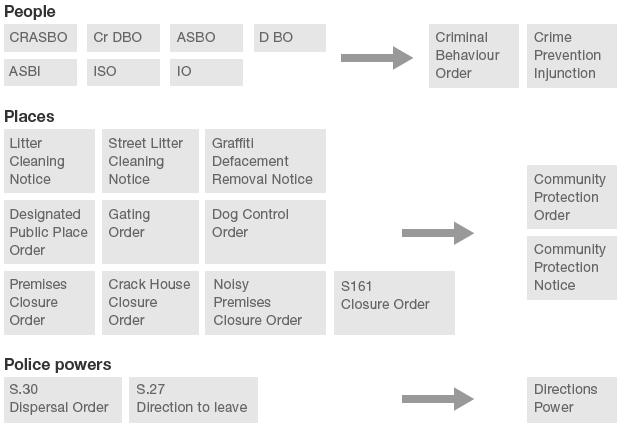Asbos to be replaced in new government proposals
- Published
Theresa May: "We will make powers simpler, quicker, easier to enforce"
The government has announced new plans to tackle anti-social behaviour in England and Wales, including orders to replace Asbos.
<link> <caption>Proposals in the government's White Paper</caption> <url href="http://www.official-documents.gov.uk/document/cm83/8367/8367.pdf" platform="highweb"/> </link> include cutting the number of different orders from 19 to six.
A "community trigger" would also force police, councils and agencies to act if five households made a complaint.
Labour said the new measures were a "weaker rebrand" of powers to tackle anti-social behaviour.
The government says it wants to take the existing 19 powers and reduce them to six which are connected to the behaviour of people, the protection of places and the powers of the police.
Under the new proposals:
Asbos and six related orders relating to the behaviour of people, such as Drink Banning Orders, will be replaced in England and Wales by two orders: the Criminal Behaviour Order (CBO) and a Crime Prevention Injunction (CPI)
The CBO will be available to be used against people convicted of crime
The CPI is a civil order and similar to the existing Asbos - but ministers say it will be available at an earlier stage of bad behaviour and be easier and faster to use
CBO and CPI have a lower standard of proof and could be put in place in days or even hours, the government says
Ten current laws relating to protection of places will be reduced to three types of Community Protection Orders
Police powers to allow them to force people to move on are to be consolidated into a single power under which the police will not need to designate a dispersal zone in advance and can order people to leave an area for up to 48 hours
People who fail to comply with the order face a £2,500 fine or three months imprisonment
'Easier and faster'
Home Secretary Theresa May told the Association of Chief Police Officers (Acpo) annual conference in Manchester that the government's approach "empowers local communities, places victims' needs at its heart and puts more trust in the professionals than ever before".
Mrs May said the community trigger would be piloted in three areas - Manchester, Brighton and Hove and West Lindsey, in Lincolnshire, from 1 June. It will force the police, councils and other agencies to act if five households complain, or the same individual complains three times.
And she told Acpo the new approach "will not dump all of society's problems on the police".
"We are challenging local agencies to do more to prevent crime and anti-social behaviour in the first place - lowering the burden on the police - and our new powers are available to range of agencies and explicitly include actions to change an offender's behaviour and stop future incidents."
Mrs May earlier told the BBC that Asbos were "too bureaucratic" and took too long to put into place.
The Home Office first signalled an end to Asbos, introduced under Tony Blair's Labour government, earlier at the start of last year.
It believes the orders are seen by some youths as a badge of honour and it has pointed out that more than half are breached at least once.
The shadow home office minister, Gloria De Piero, says while Asbos are imperfect, the new measures will only make matters worse.
"Asbos are sometimes breached and that's a really serious thing. That's why you get a criminal record.
"Actually half of the people who breach Asbos end up behind bars, that's how seriously Labour took it. The new Crime Prevention Injunction, you won't even get a criminal record."
'Take victims seriously'
One woman from Backworth in Newcastle-upon-Tyne, who has been a repeated victim of anti-social behaviour, told the BBC she supported the move to lower the burden of proof for anti-social acts.
"You have to have a level of trust in the community, that people like me do not make things up.
"But the main problem is that there is not enough of a multi-agency approach to the problem.
"In my experience the police are proactive in trying to identify and find those who threaten us but the local authority is not.
"There needs to be more intelligence shared between the agencies."
Javed Khan, chief executive of Victim Support, said victims of anti-social behaviour should be taken seriously as soon as they made a report to the police.
He added: "We hope that the new Criminal Behaviour Order will deliver the rapid response for victims that is needed.
"But just dishing out the orders won't be enough. If the government really wants to put victims first, tough enforcement and follow-up will be required, to avoid making the CBO an empty sanction."
The key changes explained; Existing powers on the left, proposed powers on the right

Key: CRASBO = Criminal Anti-Social Behaviour Order; DBO = Drink Banning Order; CR DBO = Drink Banning Order on Conviction; ASBI = Ansi-Social Behaviour Injunction; ISO = Individual Support Order; IO = Intervention Order.
- Published22 May 2012
- Published9 May 2011
- Published9 May 2011
- Published30 January 2012